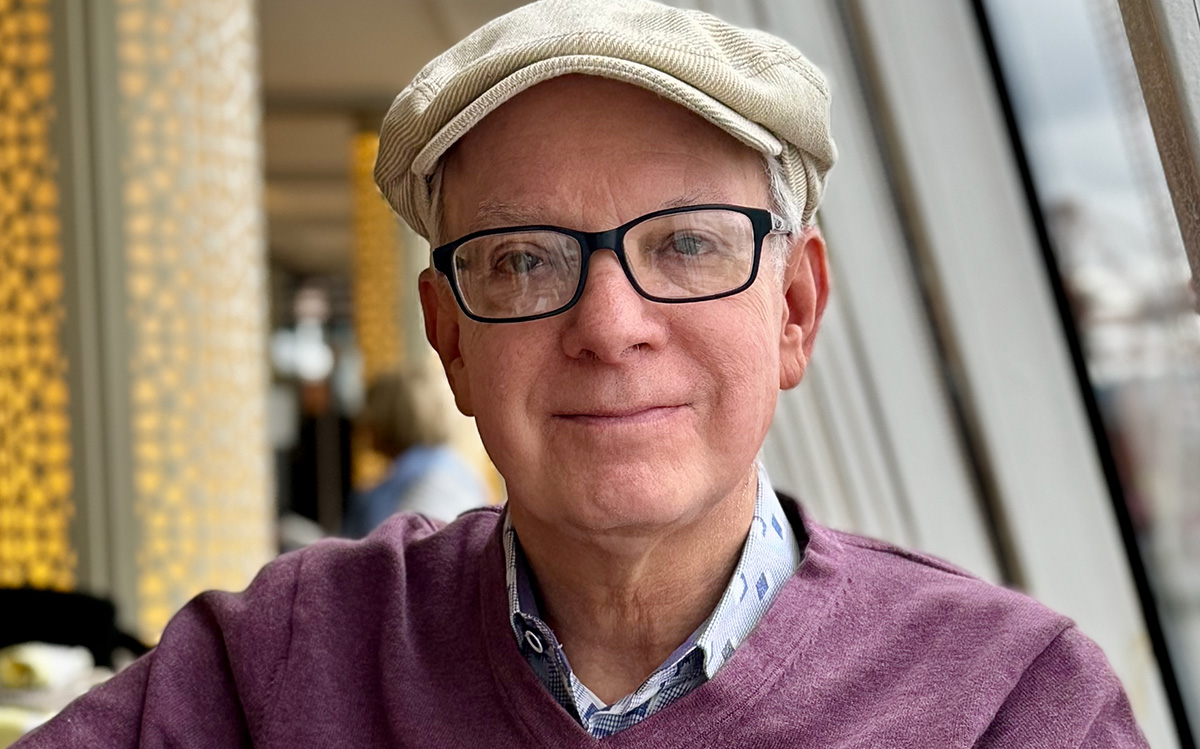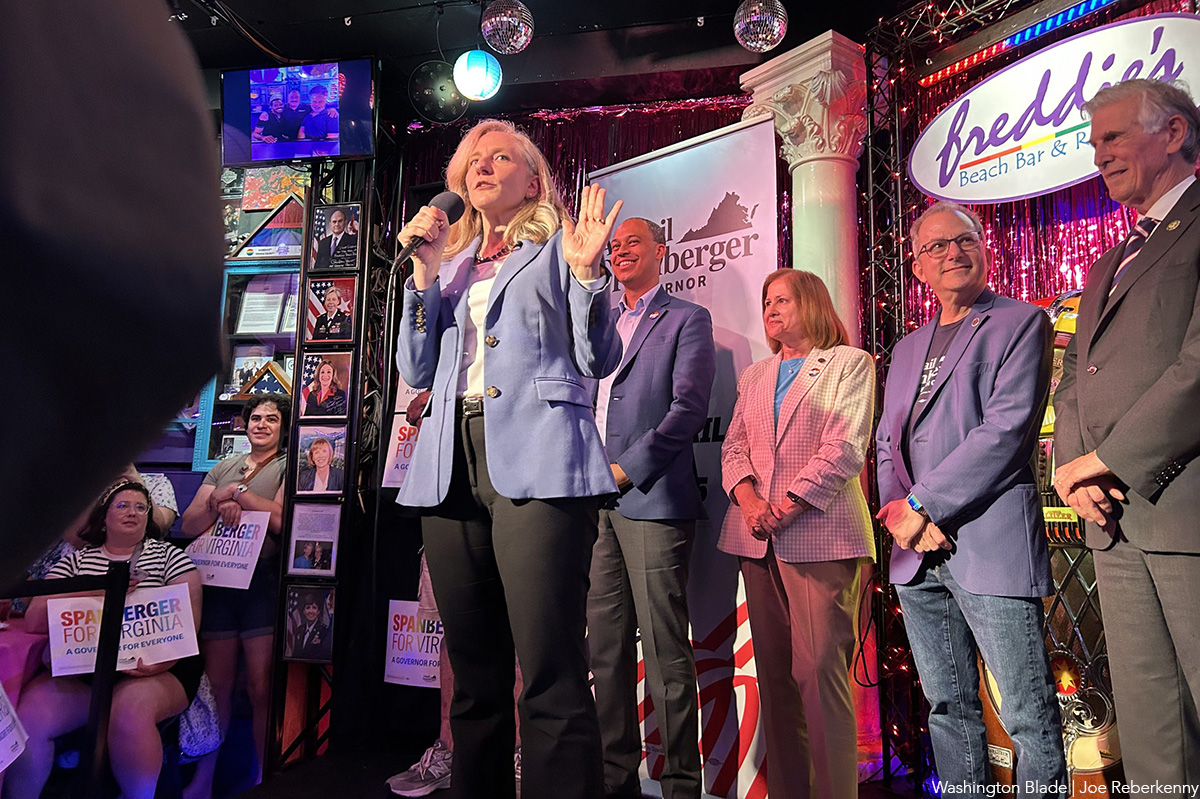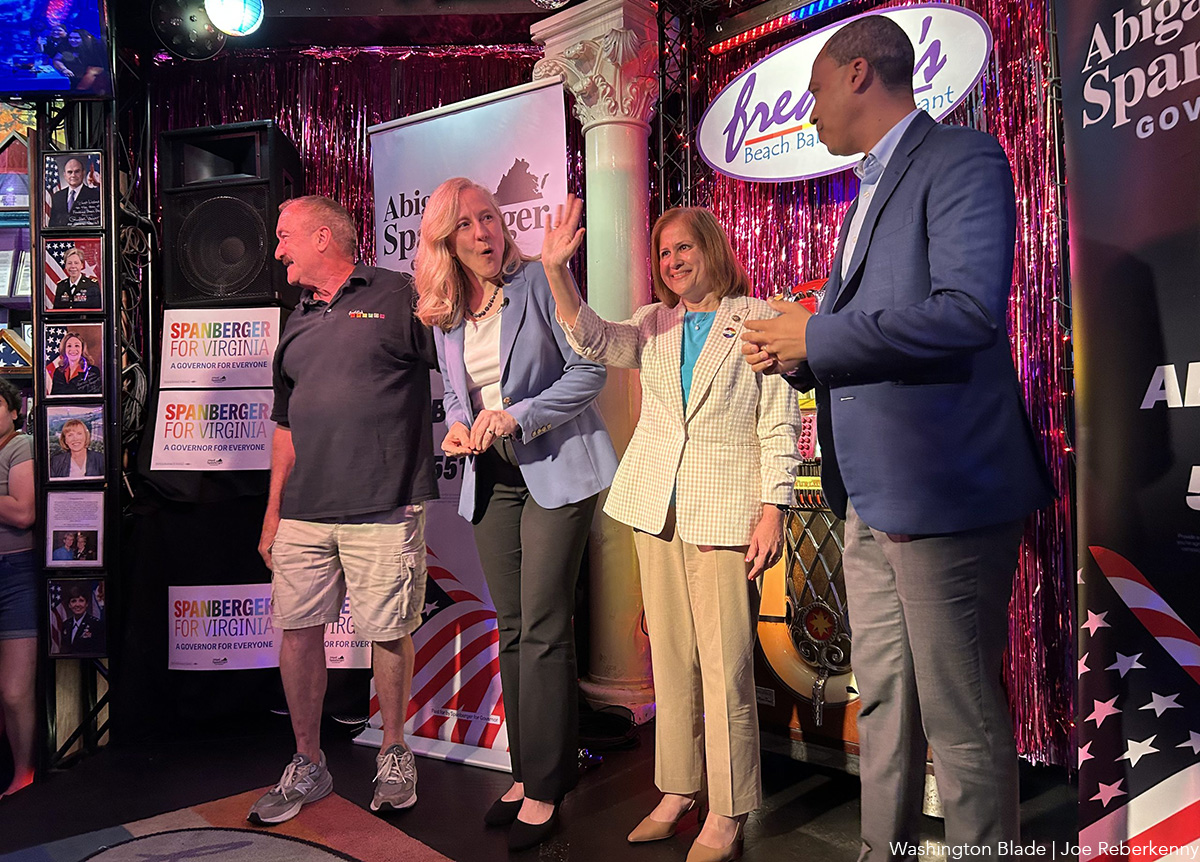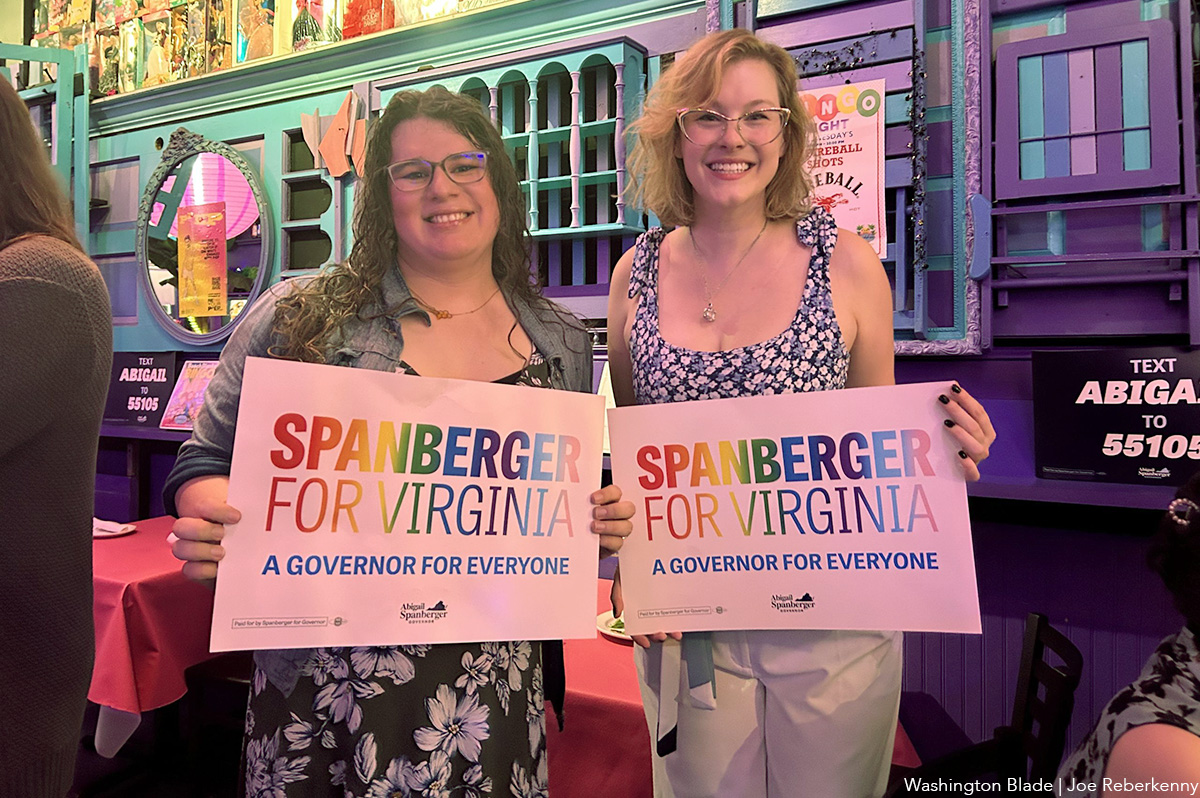Local
The lawyer strengthening LGBTQ partnerships for five decades
Larry Jacobs’s lifetime of advocacy

When most people come out, becoming a pillar of the queer community isn’t usually top of mind. Instead, they often reflect on gaining confidence in their environment, finding love and relationships, and embracing their true selves. But when one Maryland lawyer came out, he unexpectedly found himself becoming a hero to many.
Fifty years ago Lawrence (Larry) Jacobs was living a life that looked picture-perfect: A successful law career, a wife, and a son. But when he came out as gay, everything changed.
“When I started practicing law 50 years ago, there was basically no such thing by and large as openly gay people, much less openly gay lawyers,” Jacobs told the Blade about his days prior to coming out. “I was married to a woman and had a kid. I was pretty closeted until the first 10 years of my career.”
Despite the beginnings of a successful career, Jacobs felt he wasn’t being truly himself and decided to change that. It was difficult leaving his familiar beginnings and facing unsupportive people.
“When I did come out in ‘83 I got tossed out of my own law firm for being gay by my [law] partner,” he said. “So that was not a good start.”
Yet he didn’t let this change in track become a setback. Instead he used what he learned through college, law school, and life to direct him to where he needed to be. This direction, stemming from his understanding of law, began to flourish into much more for the Maryland LGBTQ community.
“I started representing gay business owners in doing corporate and business work, which was always something I was interested in,” Jacobs said. “So lo and behold, as I got more comfortable being out and I had a [romantic] partner, I started nibbling around the edges of doing activist work in Montgomery County.”
This work began with working on wills and estate planning.
“I had my first set of gay business owner clients who said, ‘Larry, we need wills,’” he recounted. “And I said, ‘I’ve never written a will.’ And they basically said, ‘Figure it out.’ That was almost 2,000 wills ago.”
During the time when Jacobs started writing wills in the 1980s, HIV, AIDS, bigotry, and sadness came to many in the community with little support from mainstream politicians.
“You know the old AIDS days, ‘80s and ‘90s, where the families would swoop in and carry the body off to Iowa and the partner would never see them again,” Jacobs recalled. “There were all these heartbreaking stories about that.”
He explained that these stories were not just kept to the queer media sidelines either. This issue was growing more and more prevalent in American society.
“One of the turning points, ironically, was a made-for-TV movie that was on HBO called ‘If These Walls Could Talk.’” Jacobs said. “It was a series of vignettes about lesbians. A fabulous actress played a grieving surviving spouse of her partner who had just died. They’re literally carrying stuff out of the house, carrying the TV and furniture and paintings out, and she’s sitting there crying.”
Seeing these tragic stories playing out in front of him, both on screen and in real life motivated Jacobs. He knew he could do more to help.
“What little bits of things can I do to make gay life better in Montgomery County, for the people that come after me,” Jacobs began to wonder. He realized that in the fight for rights, being seen is crucial to gaining acceptance.
“Working with some people, we actually put together early Montgomery Prides and ran them for a few years, just to sort of build political visibility,” he said. “I kept telling people, ‘Nobody’s gonna listen to us if they don’t see us!’ And then right around the same time, around ‘95, everything just kind of took off.”
“I got appointed to the Montgomery County Human Relations Commission by our then county executive, Doug Duncan, as an openly gay man,” Jacobs said. “Well, I had never been an openly gay man much of anything before then, but it was like, ‘Yeah, yeah, OK.’”
This seat on the Montgomery County Human Relations Commission gave Jacobs the ability to wield power to help those who needed it the most. He remembered that fighting for LGBTQ student rights in schools was a particularly big hurdle that seems all too familiar today.
“Through an odd combination of coincidences, I, with Bonnie Berger, launched the Safe Schools movement in Montgomery County to protect LGBT kids in schools, and that turned into a three ring media circus,” he began to explain. “I mean, you want to see ugly? It included getting interviewed on a radio station with a Christian fundamentalist woman who said right to my face, ‘You know, gay men on average die at age 40.’ I was like, ‘Yeah, I’m already past that. So is my partner.’”
Despite the “three ring circus,” Jacobs and Berger were able to make progress.
“We did get it passed, it got swept under the rug, but eventually we got more supportive schools,” he said. “But then I sort of somehow got involved more on the state level with the statewide organization that was then ironically called FreeState Justice.”
This then marked a shift from fighting for local policy changes to state policy changes, which Jacobs foresaw as the next step to gaining equality.
“We were desperately trying to get domestic partnership benefits,” Jacobs explained. “Nobody could get married. If you’re not married to somebody, you’re a stranger, whether that’s in Maryland or even in the District. Unless you’re registered domestic partners, you’re nothing [in the eyes of the law].”
Jacobs used his platform to inform the queer public. Without legal domestic partnerships he understood that everything two people in love had, regardless of gender and gender expression, could be taken away in an instant.
He started sharing his information by tabling and talking with members of the LGBTQ community about the state of things wherever he could, highlighting what could happen if a partner dies.
“Sometimes my husband and I, well, I would get a booth at Pride, and my husband would come with me and swelter. Sometimes my son would come with us and swelter, and it just started growing,” Jacobs said.
He would share stories about how having legally binding documents can protect a couple even against the most hateful of people.
“I had these two elderly women, one of whom was sick and we knew her partner was going to die,” he began. “I don’t remember how old she was, but she was sick. She died not long thereafter, and my client, the surviving client, went into the funeral home, and they gave her a hard time. ‘Who the hell are you? Why do you think you can make decisions?’”
“And she literally called me up and told me this. She [then] brought in a manila envelope with all the documents that we had done and pulled out the funeral document that named her, of course, as the power behind the throne, and handed it over to the funeral director, and he went ‘Oh, OK. That’s all we need.’”
While many of the issues that had plagued same-sex couples prior to Obergefell v. Hodges, the Supreme Court case that gave same-sex couples the same protections as opposite-sex couples, went away, Jacobs made it very clear legally being seen as a couple is the strongest defense to protecting everything you and your partner own.
“There’s certainly more acceptance because of marriage equality,” Jacobs explained. “And I will, without violating client confidentiality, tell you there are numerous clients that I have said to, ‘You need to get married. Yes, we’re doing these great documents, but you need to get married too for this and this and this and this reason.’ The right documents and a wedding license are a very powerful combination. Neither one by itself is foolproof, and marriage gets you a lot of things, but doesn’t get you everything.”
To summarize an extremely rewarding and impactful career Jacobs offers this piece of advice: “If I could be remembered for anything it would be ‘Get married, and get married while you can, because someday you’re going to need it, want it!” Jacobs said he plans to retire effective Dec. 27.
Maryland
Silver Spring holds annual Pride In The Plaza
‘Today means inclusion. It means to build resilience’

Silver Spring’s annual Pride in the Plaza event took place on Sunday to celebrate the LGBTQ community and emphasize inclusion and resilience.
“Today means inclusion. It means to build resilience, love,” Robyn Woods, program and outreach director for Live In Your Truth, which organized the event, said. “I mean, just being surrounded by the community and so many great entrepreneurs, business owners, and just being a part of this whole rainbow coalition that we call the LGBTQIA to be about.”
With the event being her first time organizing for Live In Your Truth, Woods said she felt emotional to see the support and love at the event.
“Some people (are) bringing out their children, their babies, their grandparents,” Woods said. “It’s a lot more allies here than anything else. That type of support to me means so much more than just support from my community; just outside support, inside support, so much support around it, so much love. Everyone’s smiling outside, helping each other.”
Attendees of the event were able to head over to the Family Fun Zone, an air-conditioned Pride Cool Down Lounge, or watch live drag performances in the main stage area.
Along with entertainment and a shaved-ice stand, rows of information tables stood along the plaza, including FreeState Justice, the Washington Spirit, Trans Maryland, Moco Pride Center, and the Heartwood Program, an organization that offers support, therapy, education, and resources to the LGBTQ community.
“I want people to know about our services, and I love what we have to offer,” Jessica Simon, psychotherapist for Heartwood Program’s Gender Wellness Clinic, said. “I (also) want to be part of a celebration with the community, and so it feels good to be here with other people who have something they want to give to the community.”
She added that within today’s political climate, to which she called an “antidote to shame,” it’s important to be celebrating Pride.
“There’s a lot of demonization of LGBTQI people,” Siena Iacuvazzi, facilitator for Maryland Trans Unity, said. “(Pride) is part of the healing process.”
Iacuvazzi said she was taught to be ashamed of who she was growing up, but being a part of a community helped her flourish in the future.
“I was taught how to hate myself. I was taught that I was an abomination to God,” she said. “But being a community is like understanding that there are people who have experienced the same thing, and they’re flourishing. They’re flourishing because they’re willing to stand up for themselves as human beings and discover themselves and understand what’s true for themselves.”
She added that Pride allows for a mutual understanding to take place.
“It’s more of a sense of belonging … and just taking that home and understanding you’re not alone,” Iacuvazzi said. “We’re each taking our own journey — we’re not putting that on each other. It’s just walking away with a sense of belonging and humanity.”
Similar to Iacuvazzi, Woods said she hopes attendees’ biggest takeaways would be family, fun, resilience, and pride.
“Being proud of yourself, being happy for who you are, and representation and how much it matters,” she continued. “And I think all these young people that are walking around here get to see versions of themselves, but older. They get to see so many different lesbian, gay, bisexual, pansexual people that are successful, that are showing love, that care, and it’s not how we’re portrayed in the media. It’s lovely to see it out here. (It’s) like we’re one big old, happy family.”
Virginia
Spanberger touts equality, reproductive rights in Arlington
Democratic Va. gubernatorial nominee made campaign stop at Freddie’s Beach Bar

With the general election heating up and LGBTQ rights under increasing threat nationwide, Virginia gubernatorial candidate Abigail Spanberger brought her “Span Virginia Bus Tour” to Arlington’s Freddie’s Beach Bar for a campaign stop filled with cheers, policy pledges, and community spirit.
Spanberger, who served three terms in the U.S. House of Representatives from 2019 through early 2025 for Virginia’s 7th Congressional District, also served as a federal law enforcement officer specializing in narcotics and money laundering cases, and as a CIA case officer working on counterterrorism and nuclear counterproliferation.
Spanberger is running against Republican nominee Winsome Earle-Sears, the current lieutenant governor of Virginia, who said she was “morally opposed” to a bill protecting marriage equality in the commonwealth.
She was joined by other Democratic candidates and supporters: lieutenant gubernatorial candidate Ghazala Hashmi, attorney general candidate Jay Jones, Virginia state Sen. Adam Ebbin (D-Alexandria), and Congressman Don Beyer.

Freddie’s was packed wall-to-wall with supporters, many of whom wore “Spanberger for Virginia” shirts in the progressive Pride flag colors. In her speech, she made it clear that LGBTQ Virginians’ rights are on the ballot this year.
“I’m so excited to be here, and I am so grateful to the entire staff of Freddy’s for letting us overtake this incredible venue that is not just an awesome place to come together in community, but is a symbol to so many people of joy, of happiness, of community and of celebrating our friends and our neighbors,” Spanberger told the packed restaurant. “It is exciting to be here, and particularly during this Pride month, and particularly as we reflect on the 10-year anniversary of Obergefell and the reality that we still have so much work to do.”
“The reality is there are so many people who still would be inclined to take us backwards,” she said. “In this moment when we see attacks on people’s rights, on people’s humanity, on Virginia, on our economy, on research, on public education, on food security, on health care, on Virginians, on their jobs, on public service and on people — it can get heavy.”
“What it does for me is it makes me want to double down, because once upon a time, when I was talking to my mother about some horror show or sequence of activities coming out of a particular administration, she did not really have the patience to listen to me and said ‘Abigail, let your rage fuel you’ — and the conversation was over. And so I reflect on that, because, in fact, every day there is so much fuel to be had in this world and in this moment.”
One of the points Spanberger continued to emphasize was the importance of steadfast state government officials following the election of President Donald Trump, which has led to rollbacks of LGBTQ and bodily autonomy rights as a result of the conservative-majority U.S. Supreme Court.
“What the past few years have shown us is that a Supreme Court decision, no matter how many years we have celebrated its existence, does not protect us in the long term. And so as governor, I will work to make sure that every protection we can put in place for the dignity, the value, and the equal rights of all Virginians is a priority.”
During her speech, Spanberger highlighted several of the key values driving her campaign — protecting reproductive freedom and human rights, lowering healthcare costs, safeguarding Virginia’s environment, and ensuring that public education is affordable, accessible, and rooted in truth, not politics.
Spanberger went as far as to say that she wants to amend the state’s constitution to remove Section 15-A. “The reality is that in Virginia, we still have a ban in our state constitution on marriage equality. It is of the utmost urgency that we move forward with our constitutional amendment.”
“We will work to ensure that that terrible constitutional amendment, that was put in years ago, is taken out and updated and ensuring that Virginia is reflective in our most essential documents of who we are as a commonwealth, which is an accepting place that celebrates the vibrancy of every single person and recognizes that all Virginians have a place, both in that constitution and in law,” she added.
Following the event, two supporters spoke to the Washington Blade about why they had come out to support Spanberger.
“I came out because I needed to show support for this ticket, because it has been a particularly rough week, but a long few years for our rights in this country, in this state, with this governor, and it’s — we need to flip it around, because queer people need protection,” said Samantha Perez, who lives in Ballston. “Trans people need protection. Trans kids need protection. And it’s not gonna happen with who’s in Richmond right now, and we just need to get it turned around.”

“The whole neighborhood’s here. All our friends are here,” said Annie Styles of Pentagon City. “It means the world to me to take care of each other. That’s what a good community does. That’s not what we’ve had with the Republicans here or across the nation for a really long time. It’s time to show that care. It’s time to make sure that good people are in a position to do good things.”
District of Columbia
Activists protest outside Hungarian Embassy in DC
Budapest Pride scheduled to take place Saturday, despite ban

More than two dozen activists gathered in front of the Hungarian Embassy in D.C. on Friday to protest the country’s ban on Budapest Pride and other LGBTQ-specific events.
Amnesty International USA Executive Director Paul O’Brien read a letter that Dávid Vig, executive director of Amnesty International Hungary, wrote.
“For 30 years Budapest Pride has been a celebration of hope, courage, and love,” said Vig in the letter that O’Brien read. “Each march through the streets of Budapest has been a powerful testament to the resilience of those who dare to demand equality, but a new law threatens to erase Pride and silence everyone who demands equal rights for LGBTI people.”
“The Hungarian government’s relentless campaign against LGBTI rights represents a worrying trend that can spread normalizing division and hatred,” added Vig. “Thank you for standing with us when we refuse to be intimidated.”
Council for Global Equality Chair Mark Bromley and two of his colleagues — Stephen Leonelli and Keifer Buckingham — also spoke. Health GAP Executive Director Asia Russell and Chloe Schwenke, a political appointee in the Obama-Biden administration who worked for the U.S. Agency for International Development, and Planned Parenthood staffers are among those who attended the protest.
(Washington Blade video by Michael K. Lavers)
Hungarian lawmakers in March passed a bill that bans Pride events and allow authorities to use facial recognition technology to identify those who participate in them. MPs in April amended the Hungarian constitution to ban public LGBTQ events.
Budapest Pride is scheduled to take place on Saturday, despite the ban. Hundreds of European lawmakers are expected to participate.
“Sending strength to the patriotic Hungarians marching tomorrow to advance human dignity and fundamental rights in a country they love,” said David Pressman, the gay former U.S. Ambassador to Hungary, on Friday on social media.
Sending strength to the patriotic Hungarians marching tomorrow to advance human dignity and fundamental rights in a country they love. Szabadság és szerelem. My past remarks on Budapest Pride: https://t.co/y1QhA9QouA
— David Pressman (@AmbPressman) June 27, 2025
-

 U.S. Supreme Court4 days ago
U.S. Supreme Court4 days agoSupreme Court upholds ACA rule that makes PrEP, other preventative care free
-

 U.S. Supreme Court4 days ago
U.S. Supreme Court4 days agoSupreme Court rules parents must have option to opt children out of LGBTQ-specific lessons
-

 National5 days ago
National5 days agoEvan Wolfson on the 10-year legacy of marriage equality
-

 Congress5 days ago
Congress5 days agoSenate parliamentarian orders removal of gender-affirming care ban from GOP reconciliation bill












